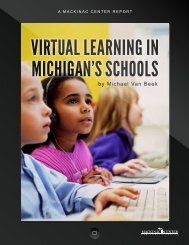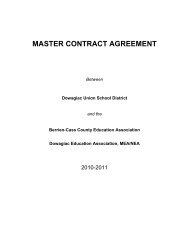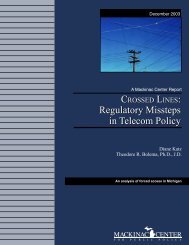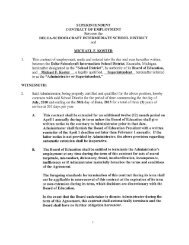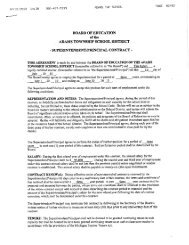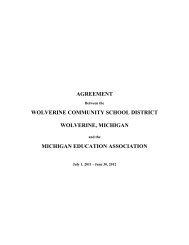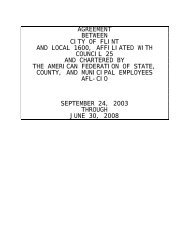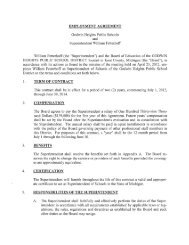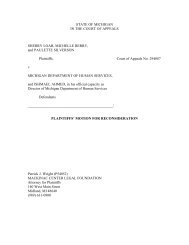The Cost of Remedial Education - Mackinac Center
The Cost of Remedial Education - Mackinac Center
The Cost of Remedial Education - Mackinac Center
You also want an ePaper? Increase the reach of your titles
YUMPU automatically turns print PDFs into web optimized ePapers that Google loves.
<strong>The</strong> <strong>Cost</strong> <strong>of</strong> <strong>Remedial</strong> <strong>Education</strong>:<br />
How Much Michigan Pays When Students Fail to Learn Basic Skills<br />
<strong>Mackinac</strong> <strong>Center</strong> for Public Policy<br />
Poor Mr. Krook’s life is blighted not only by his inability, but by a pr<strong>of</strong>ound ignorance<br />
which, without his knowledge, forever prevents him from improving his lot. He shows traits<br />
<strong>of</strong> meanness and cunning and looks out solely for himself. Not having learned his letters as a<br />
boy, he now finds it slow and difficult to learn them in old age. He never succeeds. Not<br />
having had any experience <strong>of</strong> orderly instruction, he indeed suspects those who might teach<br />
him. <strong>The</strong> simple matter <strong>of</strong> the rules for reading and writing remain a remote mystery to him.<br />
<strong>The</strong> loss that Krook worries about in his lack <strong>of</strong> education, in not having “learnd afore,”<br />
appears inevitable.<br />
Dickens devoted great energy to the advocacy <strong>of</strong> democratic education. <strong>The</strong><br />
intellectual achievements <strong>of</strong> Western civilization constituted a legacy, he thought, that<br />
belonged by rights to everyone. Sensible education ought to make that legacy available to as<br />
many as possible, and in an effective way.<br />
An author by trade, Dickens certainly held a stake in the spread <strong>of</strong> literacy. Both<br />
literacy and facility with numbers are important themes in Bleak House. In contrast to the<br />
pathetic Mr. Krook, young Esther Summerson, although an orphan brought up in a foster<br />
home, has received a decent education and can read and write with adult fluency. Dickens<br />
assigns an entire chapter to the letters that she exchanges, while ill with a contagion, with her<br />
friend Ada. Esther’s capacity for self-expression aids her in coming to terms with the<br />
complexities <strong>of</strong> adult life that gradually, in the course <strong>of</strong> the novel, impose themselves on<br />
her. Esther’s literacy enables her to find order in the great mass <strong>of</strong> facts and evidences that<br />
constitute the world. A minor character, Tom-All-Alone, is a street urchin, whom Dickens<br />
pictures as staring in bewilderment at the notices and advertisements <strong>of</strong> London’s shops. His<br />
illiteracy shuts him out from participation in the market and all but dooms him to beggardom.<br />
<strong>Education</strong> is also<br />
supposed to give<br />
the student a basic<br />
package <strong>of</strong><br />
knowledge that<br />
provides him with a<br />
minimal context<br />
for understanding<br />
life, politics, and<br />
society.<br />
<strong>Education</strong> is supposed to do something for those who undergo it. It is supposed, by<br />
the time the student graduates with a high-school diploma, to have established the<br />
intellectual foundations <strong>of</strong> adult maturity. It is supposed to have prepared the student, not<br />
merely to enter the market with basic competency in verbal and numerical skills, but for the<br />
lifelong endeavors <strong>of</strong> continuing his own education, <strong>of</strong> understanding the many and <strong>of</strong>ten<br />
bewildering manifestations <strong>of</strong> culture, both high and low, and <strong>of</strong> examining himself in<br />
objective terms. <strong>Education</strong> is also supposed to give the student a basic package <strong>of</strong><br />
knowledge, related to the traditions on which modern civilization rests, that provides him<br />
with a minimal context for understanding life, politics, and society. Charles Dickens was<br />
certainly not alone in comprehending these things. Our judgment <strong>of</strong> what it means to be<br />
literate in a competent adult fashion—and therefore <strong>of</strong> what it means not to be literate in that<br />
fashion—is as old as the founding <strong>of</strong> Greek education in the fifth century B.C. 38<br />
38<br />
<strong>The</strong> requirements <strong>of</strong> Greek education after the advent <strong>of</strong> alphabetic literacy can be gleaned from<br />
the literary remains <strong>of</strong> Athenian civilization: <strong>The</strong> basis <strong>of</strong> education lay in the alphabet, the<br />
minimal set <strong>of</strong> characters, in an arbitrary order, for allowing the writer to spell or to pronounce any<br />
word in his language according to set (minimal) rules. We call this principle phonetics. Once<br />
schoolchildren had learned their abecedary, they started to read. Greek education, which produced<br />
what is arguably the most intellectually and artistically dazzling cultural outburst known to history,<br />
was heavily literary, based on Homer’s epic poems and on tragic drama. At later, higher stages,<br />
the skills <strong>of</strong> argument, especially the rules <strong>of</strong> logic, became important. Geometry entered the<br />
pedagogical picture at an early age. A knowledge <strong>of</strong> civics and, to some extent, <strong>of</strong> history, was<br />
also deemed important.<br />
September 2000 23



